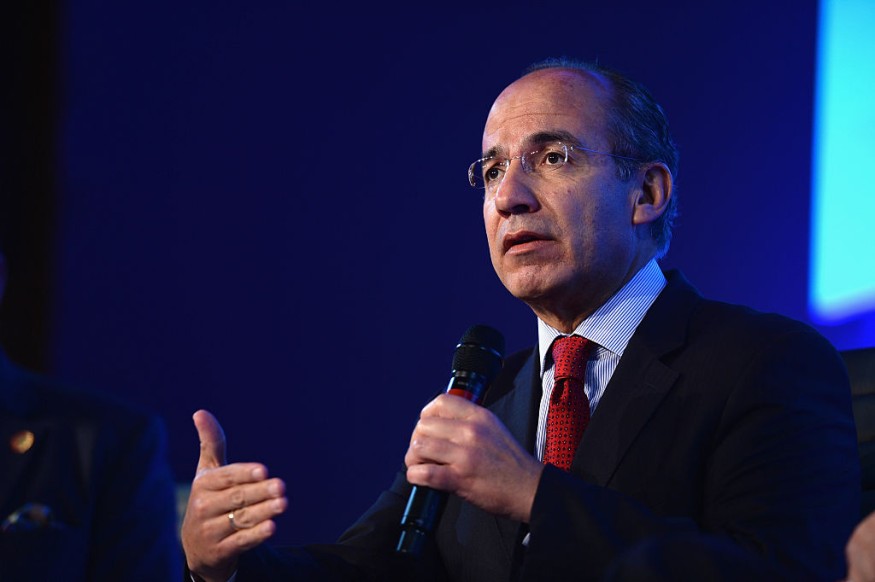Felipe Calderon and the Start of the Years-long Bloody Mexican Drug War Campaign

Former President of Mexico Felipe Calderon is known for his early involvement in politics, with his father helping found the center-right National Action Party (PAN) in 1939.
Calderon campaigned actively for the party as an elementary student, leading him to head the PAN's youth organization. According to Britannica, he then rose ranks and represented the party in the federal Chamber of Deputies from 1991 to 1994.
His political career did not stop there, as he became the president of Mexico from 2006 to 2012. Calderon won against the now-Mexican President Andres Manuel Lopez Obrador, who challenged the results by claiming voting irregularities and fraud.
During his term, Calderon delivered success within the business, environmental, and educational sectors.
But his most well-known policy was in the healthcare industry, wherein he introduced comprehensive insurance known as Seguro Popular. His administration also worked on expanding infrastructure to ensure high-quality care and services.
Harvard School of Public Health noted that Mexico announced that it had reached more than 50 million enrollments in health insurance in less than a decade and even attained universal coverage.
Aside from his popular policy on the health sector, Calderon also introduced a campaign that has remained controversial even after his presidency.
READ NEXT: Mexico: Former Security Chief Genaro Garcia Luna Embezzled $745.9 Million From Government Contracts
Felipe Calderon's Mexican Drug War Campaign
Felipe Calderon launched the Mexican drug war campaign on December 10, 2006, when he sent 6,500 troops into his home state Michoacan, where rival cartels engaged in a war for control over drug trafficking routes.
The former president declared war against Mexican drug cartels for eight days after he was seated as the country's leader.
The Guardian reported that his move was seen as an effort to have a sense of legitimacy after election results were contested. The number of troops involved in the drug war grew to 20,000 within two months.
From 2007 to 2016, Mexico spent at least $54 billion on security and defense. Critics previously said this influx of cash has helped create an "opaque security industry" that could be influenced by corruption.
However, the biggest costs of the drug war have been human since around 200,000 people were murdered during the same period, while more than 28,000 reportedly disappeared.
Calderon's time as the president also saw the arrest and killing of the heads of the Beltran Leyva and Los Zetas cartels. The operations of the Mexican drug war grew larger after Calderon's successor, Enrique Peña Nieto, took power in 2012.
At least 101 of his administration's 122 most wanted capos were reportedly dead or captured. However, the U.S. played a role in doling out the "war on drugs" manifesto, which started in 1973 with President Richard Nixon.
Nixon established the Drug Enforcement Administration (DEA) to declare "an all-out global war on the drug menace." The United States has since then spent over $2.5 trillion in the campaign through prohibition and militarization.
Some U.S. agents also became the price to pay for snuffing out the illegal narcotics industry, with one case being the most notable - the kidnapping and torture of former DEA agent Enrique "Kiki" Camarena Salazar.
Camarena was closing in on the operations of the Guadalajara Cartel, formerly led by Rafael Caro Quintero, Miguel Angel Felix Gallardo, and Ernesto "Don Neto" Fonesca. The leaders of the powerful cartel all took the fall after Camarena was found dead.
Mexican Drug Cartels
According to CNN, some of the most notorious cartels with large operations in Mexico include the Jalisco Cartel, which the U.S. Justice Department believes to be one of the five most dangerous criminal groups.
It was closely followed by Sinaloa Cartel, whose leader managed to escape prison several times before being extradited to the U.S.
Former Sinaloa Cartel boss Joaquin "El Chapo" Guzman Loera was first arrested in Guatemala in 1993 and extradited to Mexico, where he was sentenced to 20 years in prison for murder and drug trafficking.
But in 2001, he escaped from prison. He was arrested again in Sinaloa in 2014 but escaped again from prison through a tunnel the following year.
Mexican officials announced in January 2016 that El Chapo had been captured again. He was extradited to the U.S. the following year.
El Chapo was sentenced to spend the rest of his days in the ADX Florence "supermax" prison in Colorado after being sentenced to life imprisonment in 2019 on multiple drug-related charges.
Due to its connections with the Jalisco cartel, reports said the Tijuana Cartel may still currently regain its power.
This article is owned by Latin Post.
Written by: Mary Webber
WATCH: What Caused Mexico's Drug War? - From PBS NewsHour
Subscribe to Latin Post!
Sign up for our free newsletter for the Latest coverage!
© 2026 Latin Post. All rights reserved. Do not reproduce without permission.














